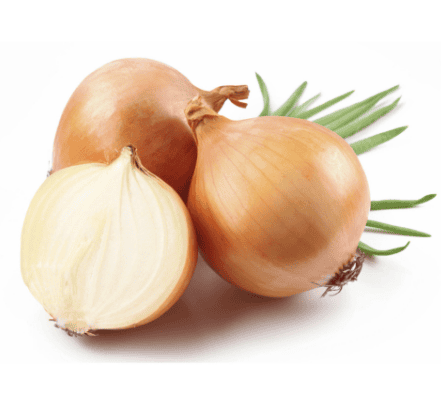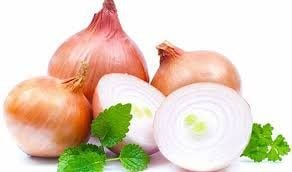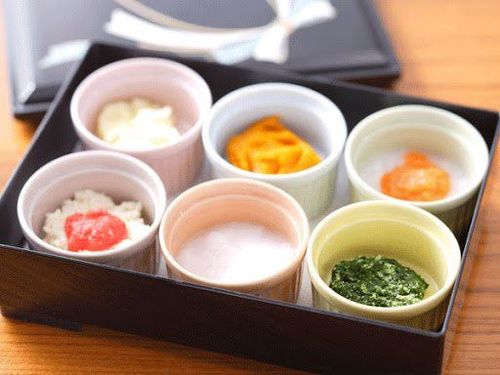This is an automatically translated article.
Should onions be used for baby weaning? When can children eat onions? These are questions that many parents are interested in. Onions can be introduced as soon as the baby is ready to start solid foods, usually around 6 months of age. Parents can consider feeding their babies onions by steaming onions with rock sugar for babies. However, they may also be concerned about the safety of onions for babies. This post talks about when to introduce onions to babies, how to do it safely, its benefits, and western recipes for baby weaning.1. Should onions be used for baby food? Benefits of onions
1.1. Onions in the baby's weaning diet Onions are considered a common spice in many dishes. This vegetable adds flavor and texture to food preparations, while its phytochemical profile benefits health in the long run. So many delicious dishes start with a little onion. Stews, tacos, salsa, soups - onions are in everything! With all the recipes that can be made from onions, parents always ask the question "Is onions suitable for baby's weaning?".When and how to introduce babies to solid foods can sometimes make parents feel confused about food choices. Luckily, it's relatively simple to start giving your baby onions.
With its firm texture and rich flavor, onions may not be a top-recommended food when moms think of solids - but according to the American Academy of Pediatrics (AAP), no There is a perfect food order to include a wide variety of solids. Pediatrician nutritionist Grace Shea confirms: 'It is safe to give onions to babies when they start eating solid foods, starting at around 6 months of age. Also according to the American Academy of Pediatrics, signs of being ready for solid foods include:
Baby is able to hold his/her head up Moving food from spoon to throat Open mouth as food approaches Double weight When babies exhibit these parameters, mothers may consider adding onions and making it a choice in their baby's weaning meals.
1.2. Benefits of Onions for Babies Onions are a healthy food for people of all ages - including babies! "Onions are packed with nutrients that are beneficial for babies, like fiber and prebiotics, which aid in digestion," says pediatric nutritionist Grace Shea. One small onion contains about 1 gram of these substances. This may not sound like much - until you consider that babies only need about 5 grams of this nutrient per day. In addition, onions are a significant source of vitamin C with 5 milligrams (mg) per small onion. (That's about 10% of the recommended daily intake of 50 mg for babies aged 7 to 12 months.) Getting enough vitamin C can help your baby's body make collagen, which helps neutralize free radicals. damage and maintain immunity. In smaller amounts, onions also provide folate, vitamin B6 and potassium.
With a special taste, onions are not easy to put in children's dishes. But aside from their nutritional benefits, onions have the benefit of being sodium-free and without any artificial ingredients in them.
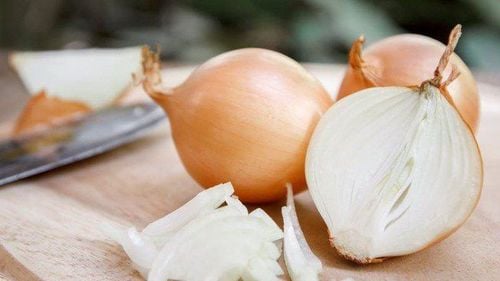
Bạn có thể bắt đầu cho trẻ ăn hành tây từ 6 tháng tuổi
2. How to choose and preserve onions for processing for children
2.1. Onion tip Choose onions that are firm, thin to the touch, like a tissue or tissue paper. Avoid onions with bruises, cuts, and bumps. In addition, they should be free of black or gray mold and any visible sprouting. Discard onions that are too dry or wet or soft to the touch. Choose sweeter varieties of onions for babies because they have sensitive tongues. 2.2. Onion storage tips Store whole dried onions in a dark, dry, cool place with proper ventilation. Keep them out of sunlight and try to maintain a temperature around 77 °F (25 °C). Store packed onions in a cardboard box or bag at least a foot away from the wall to allow air to circulate. Do not store onions in plastic bags or airtight containers as lack of ventilation will shorten their shelf life. Do not store onions with foods that release moisture, such as potatoes. It will make the onions wet and spongy. Avoid storing whole onions in the refrigerator as they can absorb moisture and become mushy. You can store peeled and cut onions in an airtight container in a cool place, such as the refrigerator, for up to a week. However, this is not recommended as they may lose their nutritional value.3. Prepare dishes from onions for children
3.1. Cooking Precautions Feed your baby onions as pureed cooked onions or add them to various dishes, such as soups, stews, cereals and porridges in small amounts. You can start by adding a teaspoon to your food and gradually increase it to a tablespoon or two, depending on the recipe's requirements. Once your baby seems comfortable with the taste and digestibility of onions, gradually introduce onions to different baby dishes Onion allergies are uncommon but can happen. Its symptoms can appear soon after touching or ingesting an onion. Watch out for its signs, such as a skin rash anywhere on the body, coughing and wheezing, vomiting, and diarrhea. If your baby has a family history of allergies, especially to foods in the rose family (garlic, leeks, shallots, asparagus and chives) and certain types of pollen, ask for advice. doctor before adding onions to your baby's diet. Infants with sensitive digestive systems may be intolerant to FODMAPs after eating onions even in the cooked form. Typical symptoms include gas, bloating, and abdominal cramps.
Một số trẻ sơ sinh có thể bị chướng bụng, đau bụng sau khi ăn hành tây
Preparation:
1⁄2 Small squash (peeled, chopped and steamed) 2 tablespoons carrots (peeled, chopped and steamed) 1 tablespoon shallot (peeled, minced and steamed) Method:
Blend all ingredients into a smooth, lump-free mixture in a food processor or blender . Add water to adjust the consistency. Pour the puree into a serving bowl and serve. Green Bean Onion Soup
Preparation:
100ml low sodium vegetable broth 50g shallot (sliced) 30g frozen peas 1 tablespoon dried thyme 2 tablespoons olive oil Method:
Heat olive oil in pan over medium heat and sauté the onions for 10 to 15 minutes. Add the thyme, peas, and vegetable broth to the pot and cook the mixture for 15 to 20 minutes over low heat. Turn off the heat and set the pan aside. Blend all ingredients into a smooth, clump-free liquid using an immersion blender. Pour the soup into the soup bowl, add some cream or milk and serve immediately. You can add cooked pasta, quinoa, or cooked oats to this recipe for toddlers. Baked onions
Preparation:
1 white onion (sliced) 1 egg (beaten) 50g whole wheat flour 50g bread crumbs 80ml unsalted buttermilk 2 tablespoons cornstarch Method:
Mix buttermilk and onions in a mixing bowl, cover with cling film and refrigerate for a minimum of six hours. After six hours, preheat oven to 392°F (200°C). Line a baking tray with parchment paper and then set aside. Mix the flour and cornstarch in a large zippered storage bag. Remove the onion rings from the buttermilk and transfer them to a zippered storage bag. Close the bag and shake until the onion rings are completely coated. Dip each onion slice in the egg and cover with breadcrumbs. Place on baking tray with space between each ring. Once all the onion rings have been placed on the baking sheet, drizzle some oil or butter and bake the onion rings for 15 minutes. Transfer the grilled onion rings to a serving plate and serve immediately with hummus, homemade ketchup or dip. These rings can also be added to other recipes to enhance their flavor.
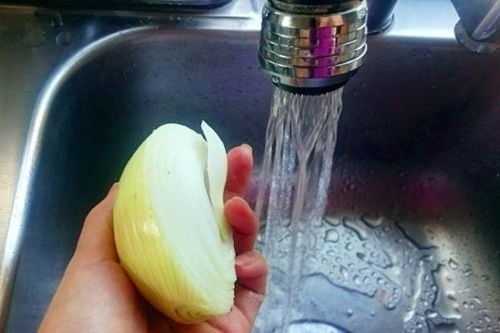
Lưu ý không nên rửa hành tây quá nhiều lần vì có thể làm mất chất dinh dưỡng
Preparation:
Alum sugar: 20g Onions: 1⁄2 bulbs Method:
Peel and slice onions very thinly. Next, break the rock sugar into small pieces and mix well with the onion, then steam it for about 30 minutes, turn off the heat and let it cool.
Onion is a food with delicious taste, which can increase the palatability and nutritional value of the dish. You can give onions to babies and toddlers in different age-appropriate forms. Onion bread, onion soup, onion puree, and rock sugar steamed onions are some other onion recipes that you can feed your baby or toddler. You can also add onions to other dishes, such as eggs, rice, pasta, curries, and casseroles.
Please dial HOTLINE for more information or register for an appointment HERE. Download MyVinmec app to make appointments faster and to manage your bookings easily.
Reference source: momjunction.com, healthline.com



